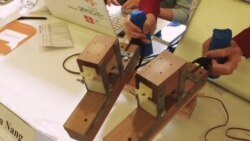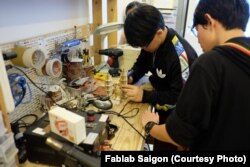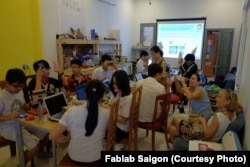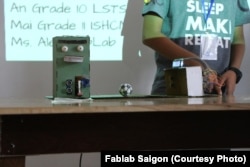When U.S. diplomats made a trip to Danang last year, Vietnamese students presented the visitors with a small replica of the White House, which they had just created using a 3D printer.
That and other machines were made available at Fablab Danang, part of a global network of open laboratories that let people fabricate products and inventions that might otherwise be impossible for someone working alone. Fablab is also part of a growing movement in Vietnam, which relies on technology and practical training to get young people excited about finding a career.
Creativity and relevant skills
The creativity that goes into these labs and other efforts is meant to be a cure for a bad stereotype in Vietnam: employees only learn useless theory in school, and don’t know how to apply their knowledge in the workplace.
Tran Hoang Quan, a lecturer in the electronics division of the Ho Chi Minh City University of Technology, wants to combat this stereotype with project-based learning. He said students will be more motivated if they can link their studies to real-world work and develop “jaw-dropping” projects.
No more classroom zombies
“In university, they study things they’re not inspired [by], it’s not a career. They’re like zombies in the classroom,” Quan said last Friday in a presentation at the Vietnam Engineering Education Conference in Ho Chi Minh City.
Quan and others are backing creative environments that can inject new life into the academic zombies. Fablabs and the similar “makerspaces” offer everything from laser cutters to sewing machines to hand tools.
Applying devices to the real world
Vo Minh Tri shared the experience of his makerspace at Can Tho University, in the Mekong Delta, where he heads the automation technology department. Students mix software and hardware, including 3D scanners and printers. They experiment with devices, like a larva counting machine that is supposed to increase the productivity of shrimp farming, a major industry in the delta.
“My students are encouraged to go there and do what they like,” Tri said at the conference.
Low wages have helped Vietnam bring in foreign investment, but there are those who worry that this country of 90 million will just be the world’s next cheap factory floor.
Vietnam wants to upgrade its workforce at the same time that its neighbors across the Association of Southeast Asian Nations (ASEAN) are looking to do the same. The 10 states are bracing for increased competition expected under the emerging ASEAN Economic Community trading bloc.
Quan said the workforce upgrade could involve a sort of virtuous cycle. “The more you are good at something, the more motivation you have to do the job,” he said.
In his view, as Vietnamese become more passionate about their work, their skills improve, and with better skills, their passion grows.
He described, as an example, teaching students about sensors and micro-controllers, so that they can tinker with potential products that are part of the internet of things.
Combining academics with startup companies
At Fablab Danang, makers have come up with inventions that track the weather, clean up dust, and assist the disabled with reading.
At Fablab Saigon, there’s less emphasis on students and a clearer link to the tech startup crowd. The lab combines co-working space with a cafe and a community garden, and also hosts events to connect different sectors.
“We’re not replacing universities at all,” said Hoang-Anh Phan, who gave her title as the Fablab Saigon guardian. “We’re just providing a complementary playground.”
The World Bank estimates that two out of every three employers in Vietnam complain about the lack of soft skills among job seekers. These include problem-solving, teamwork, leadership, adaptability, and independent learning.
These are also the kinds of skills that young people, in theory, could develop through the makerspaces and Fablabs.
















